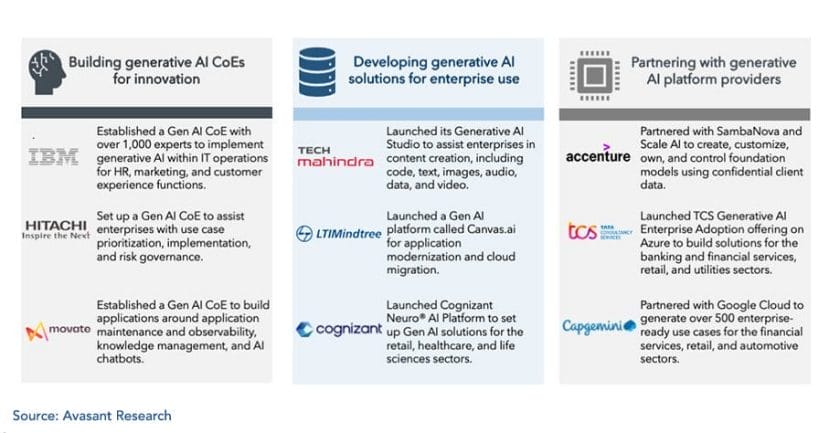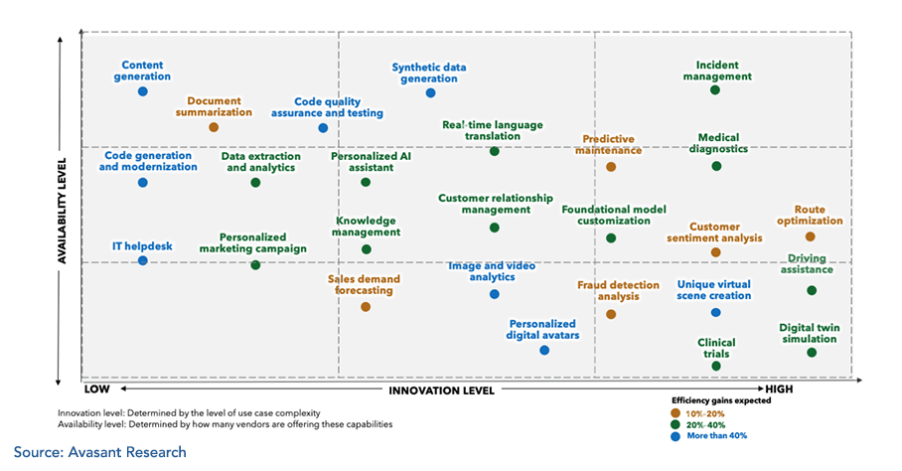Introduction
Generative AI has gained significant enterprise attention, and organizations across sectors are looking to leverage its potential to improve customer service, employee productivity, and time to market. This widespread interest has stimulated a wave of adoption, offering a lucrative opportunity for service providers. They, in turn, are responding to this increased demand by developing innovative solutions, strategically positioning themselves to monetize the burgeoning interest in generative AI.
Surging Interest and Investments in Generative AI
AI has always been a principal investment area for service providers, with a spotlight on pioneering technologies such as deep learning, computer vision, quantum AI, and neuroscience-inspired AI. These technological strides have laid the foundation for complex problem-solving in areas like drug discovery and fraud detection. However, generative AI is reshaping how we approach problem-solving and decision-making, enabling new solutions such as interpreting complex algorithms and developing personalized therapy bots. Consequently, it is hardly surprising that corresponding budget allocations and dialogues with clients regarding generative AI have seen a substantial upswing in the past six months.
Accenture made a significant announcement in June 2023, revealing a USD 3B investment in AI over the next three years. Their plan includes doubling its data and AI workforce from 40,000 to 80,000, specifically focusing on deploying generative AI for clients. They have also established a dedicated Center for Advanced AI staffed by 1,600 specialists assigned to generative AI.
Infosys announced in June 2023 that they are catering to over 50 clients using generative AI, demonstrating their commitment to leveraging this technology to drive client success.
IBM Consulting has also been actively engaging with clients in the generative AI space, with interactions reported for over 100 clients and utilization of generative AI in multiple projects as of May 2023.
Unlocking New Revenue Streams
A study by Cornell University indicates that large language models (LLMs) could speed up approximately 15% of all worker tasks in the US while maintaining the same level of quality. This percentage rises substantially to between 47%–56% when software and tools built upon LLMs are incorporated into these tasks. As a result, corporate leaders acknowledge the paramount importance of generative AI in their business strategies. They plan to devote much of their budget to this technology in the upcoming 12–18 months. While they recognize the need to partner with service providers to effectively deploy generative AI, many organizations are still determining where to begin and are apprehensive about potential risks. During their discussions with service providers, clients expressed interest in understanding how generative AI can influence their business processes. They also want to know what the necessary steps are to mitigate the potential negative impacts of adopting this technology and effectively manage change within their organizations. Reacting to these needs, service providers have launched new solutions, formed new partnerships, and built CoEs dedicated to innovation in generative AI.

Figure 1: Service providers are evolving with generative AI’s rapid growth to assist enterprises.
As many service providers venture into the realm of generative AI, a few had the foresight to invest early in its R&D. Infosys, for example, capitalized on its initial investment in OpenAI and generative AI research back in 2015, resulting in the development of solution accelerators for legacy code transformation, interlanguage conversion, document summarization, and data enrichment. Similarly, Wipro revealed that it invested in a generative AI research program with the University of South Carolina and IIT Patna two years ago. This program was designed to build language models for the healthcare sector, focusing on personalized care plans and medical research.
No matter where they currently stand in their journey with generative AI, these service providers share a common goal to capture the immense enterprise demand for generative AI solutions. It has driven service providers to explore a wide array of use cases for generative AI tailored to meet the varied requirements of businesses.

Figure 2: Generative AI use cases gaining provider’s attention.
Aligning Talent Strategy with Generative AI Growth
Several service providers anticipate significant productivity enhancements over the next 12 months, with estimates reaching up to 40%, especially in application development and maintenance, infrastructure management, and business process outsourcing. These advancements are projected to drive down the cost of services. However, providers plan to counterbalance this drop by capitalizing on the influx of project volume. As a result, cultivating the right skills, such as prompt engineers and digital trust specialists, to successfully deliver generative AI projects becomes imperative. Recognizing this requirement, several providers are proactively building a workforce pipeline equipped with generative AI skills to cater to the expected increase in demand.
TCS has trained over 50,000 associates in AI and aims to earn 40,000 skill badges in Google Cloud generative AI within the next year. This effort supports the projected demand for their new offering, TCS generative AI, which utilizes Google Cloud’s generative AI services. Furthermore, in July 2023, it announced plans to certify 25,000 associates on Azure Open AI.
HCLTech announced plans in June 2023 to train 18,000 experts on Google Cloud generative AI capabilities and 10,000 engineers and architects in advanced AI technologies with Microsoft.
Infosys announced the availability of free certification in AI and generative AI skills through the Infosys Springboard Virtual Learning Platform in June 2023. This platform is designed to provide corporate-grade learning experiences and has over 5.5 million registered users.
EXL unveiled plans to establish a CoE to assemble a team of over 1,500 specialists with deep expertise and knowledge in generative AI technologies in May 2023.
Forward-looking View
As the field of generative AI continues to mature, providers strive to distinguish their offerings. This involves developing compact LLMs that can efficiently operate on standard GPU servers and creating customer programs that aid clients in creating and managing custom models, along with effective change management strategies and workforce development programs, to ease the integration of generative AI into their current operations. These advancements are also transforming the landscape of IT/BPO contracts, necessitating flexible and adaptable contracts. Therefore, service providers should focus on the following aspects to evolve their delivery model:
Revisit pricing models: Traditional-fixed and rate-card models will likely need to be updated. New pricing models focused on outcomes and business value will emerge.
Measure ethics and data privacy: Ethics and data privacy will become integral to these contracts. Noncompliance will be measured and enforced through a penalty clause.
Establish quality assurance guidelines: Service providers must establish standards for measuring the quality of work produced by Gen AI. These standards should align with those set for human-generated output.
Generative AI is rapidly evolving, and its potential to increase productivity and cost efficiency is soon expected to influence outsourcing contracts. Yet, before we witness its full-scale integration, there is a pressing need to establish best practices and guidelines, especially concerning ethics, bias, data privacy, and security. Historically, technologies like IoT and blockchain have reshaped industries, but their impact pales in comparison to the transformative power of AI. Generative AI is catalyzing the mass adoption of AI in ways previously unseen.
By Chandrika Dutt, Research Leader, Avasant and Abhisekh Satapathy, Senior Analyst, Avasant





